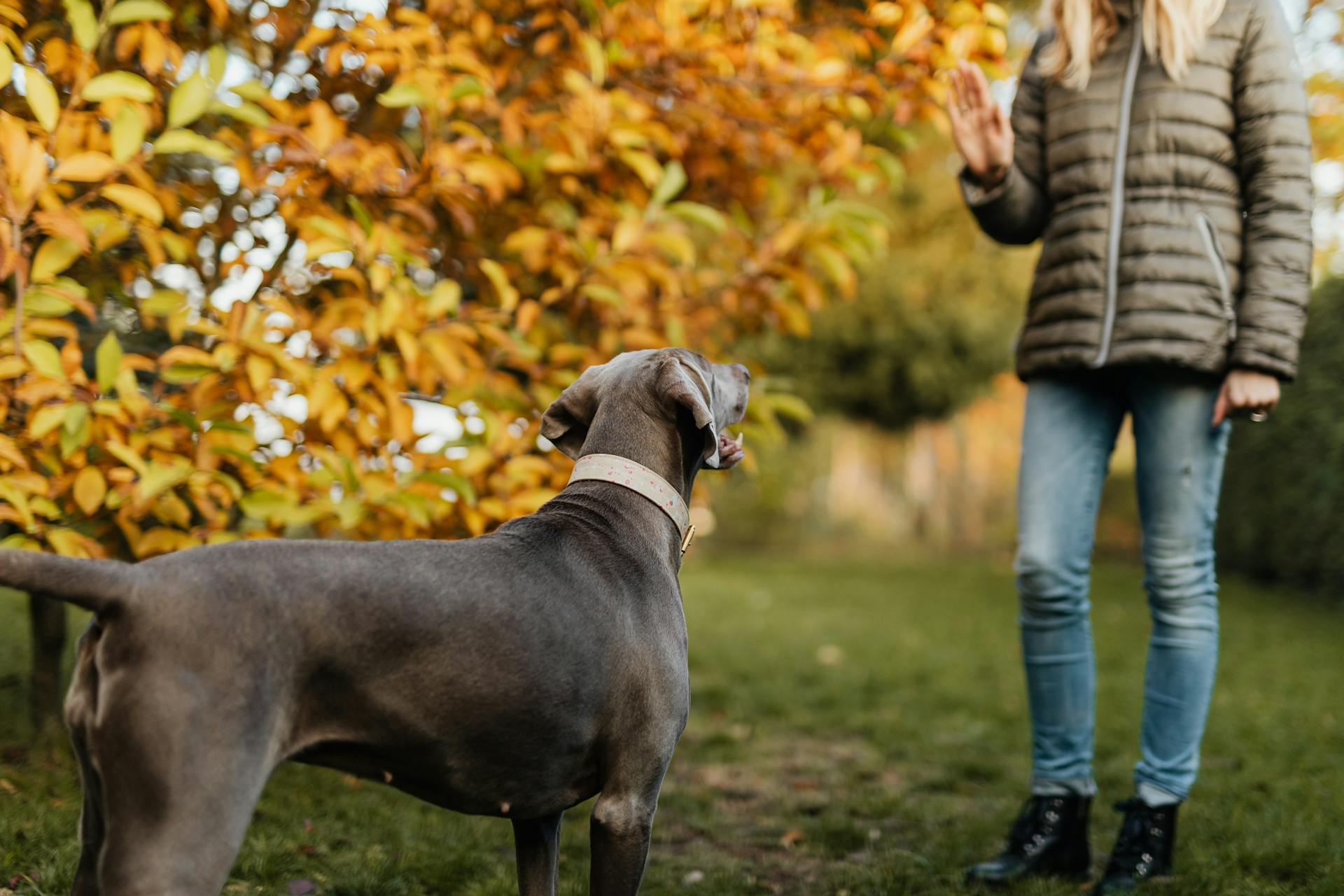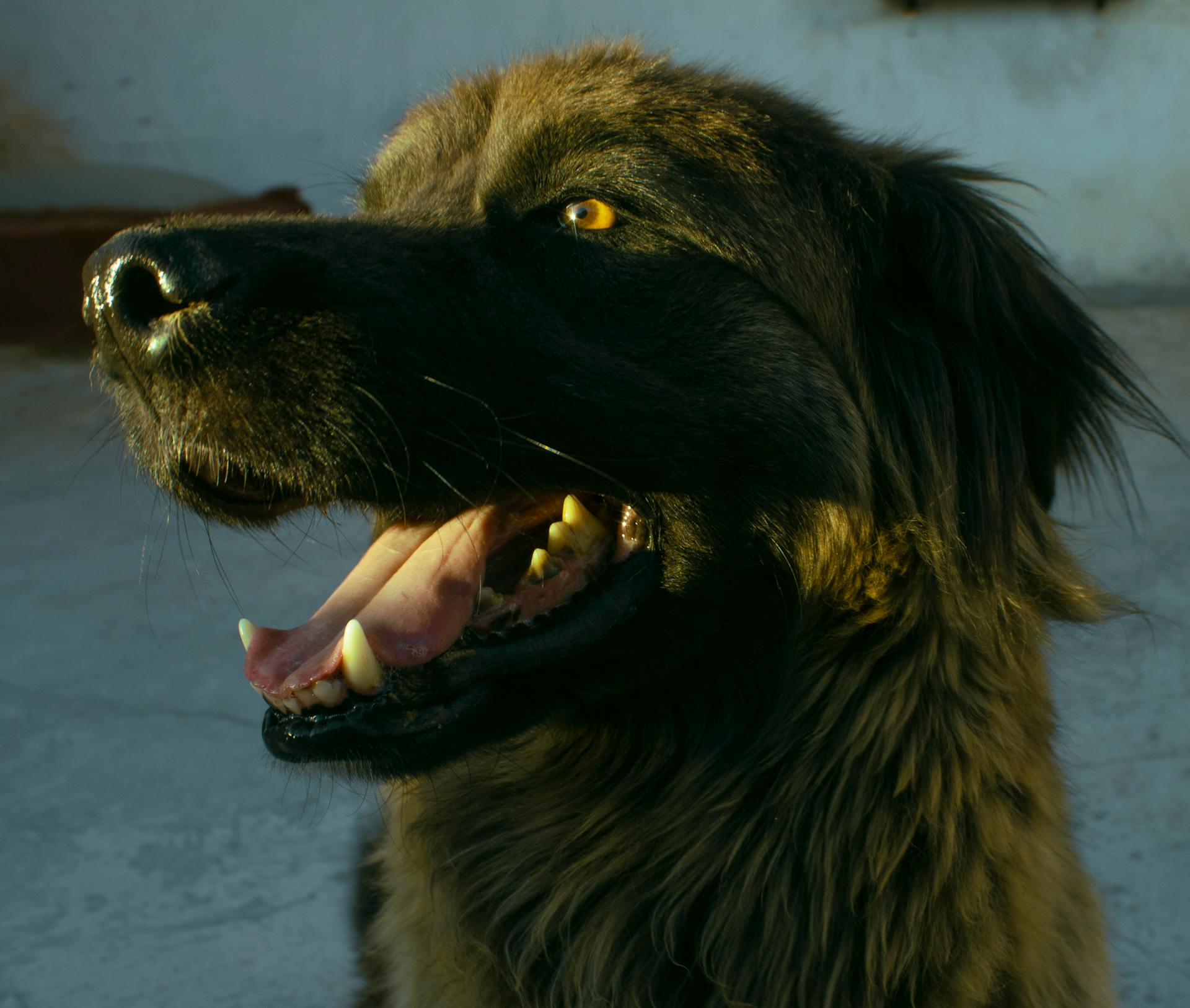
Training a Boerboel to guard your family requires patience and consistency. With a strong prey drive and high energy levels, Boerboels need regular exercise to keep them physically and mentally stimulated.
Boerboels are naturally protective of their family, but they can be wary of strangers if not socialized properly. Early socialization is key to help your Boerboel feel comfortable around new people and environments.
A Boerboel's guarding instincts can be honed through positive reinforcement training, focusing on obedience and loyalty commands. With the right training, your Boerboel can become a loyal and trustworthy guardian for your family.
Regular grooming and health checks are essential to keep your Boerboel in top condition. A well-cared-for Boerboel is better equipped to handle the demands of guarding and protecting your family.
Here's an interesting read: Doberman Guard Dog Training
Characteristics
The Boerboel is a large, muscular dog with a broad head and a strong build. It's a breed that originated in South Africa, where it was bred as a guard and protection dog.
Males should be at least 60 cm tall, ideally 66 cm, and weigh up to 70 kg. Females are smaller and lighter, ideally 61 cm tall, but at least 55 cm.
A Boerboel's gaze is alert and intelligent, and its muscular build, large, angular head, and broad neck give it an imposing appearance. This breed is known for its calm and intelligent nature.
The Boerboel is a loyal and protective breed, but it's not aggressive towards people. In fact, many Boerboels are closely bonded to their family and are very fond of children. They are patient and playful with their family, but they can be difficult to get along with and may be aggressive towards other dogs.
Here are some key characteristics of the Boerboel breed:
Overall, the Boerboel is a powerful and intelligent breed that requires consistent and loving training. With proper care and attention, it can make a wonderful companion for active families.
Origin and History
The Boerboel breed originated in South Africa, where Dutch settlers bred strong dogs to defend their farms and homes from predators and intruders. They were a mix of European breeds, including Mastiffs and Bulldogs, which were brought to the country by settlers.
These early Boerboels were bred to be fierce protectors, capable of taking on big cats, hyenas, and other wildlife that threatened the homestead. They were also gentle enough to guard livestock, including lambs, goats, and chickens.
The name "Boerboel" itself means "farm dog" in Afrikaans, reflecting their original purpose as working dogs on South African farms. They were bred to be versatile and affectionate, as well as protective.
The breed was later crossed with Bullmastiffs, which were introduced as guard dogs in the 1930s. This crossbreeding had a major influence on the Boerboel's character and appearance.
Boerboels were used to hunt and protect against baboons, which were a major threat to livestock in South Africa. Their powerful jaws and muscular build made them the perfect breed for this task.
The Boerboel's tenacity and strength were honed over centuries of breeding and selection, with only the strongest dogs surviving the harsh conditions of the South African savannah.
On a similar theme: Livestock Guard Dog
Training and Behavior
Training a Boerboel requires patience, consistency, and positive reinforcement. Boerboels are intelligent and eager to please, but they can be dominant and require an assertive trainer.
Start training your Boerboel puppy as soon as you bring them home, ideally when they're still young and relaxed. This is the best time to instill boundaries and socialize your dog.
You need to gently but firmly establish yourself as the pack leader, setting clear boundaries and rules without being harsh. Consistency is key, so make sure to praise good behavior and ignore bad behavior. A Boerboel that knows its place will be a loyal and loving companion.
Here are some essential tips to keep in mind:
- Use positive reinforcement, such as treats and praise, to encourage good behavior.
- Be consistent in setting boundaries and rules.
- Establish yourself as the pack leader and avoid letting your dog pull on the leash or get up on the couch without permission.
Remember, a well-trained Boerboel is a happy and loving companion, and with patience and consistency, you can develop a strong bond with your dog.
Training and Behavior would best fit under the heading: "Personality
Boerboels are intelligent and eager to please, but they can be dominant and require an assertive trainer who uses positive reinforcement and sets boundaries without being harsh.
They thrive on having a job to do, whether it's farm work, guard dog duty, or competing in agility and strength competitions. This breed loves human family members, especially children, but they can be overprotective at times.
Boerboels are happiest when they're given plenty of mental and physical stimulation, which can include long walks, vigorous play sessions, and challenging devices like puzzle feeders. They can get bored and anxious if they don't receive enough activity.
A Boerboel's natural protectiveness can make them fiercely territorial and aggressive if they're not trained or socialized properly. Introducing them to guests and new people is crucial to prevent them from feeling threatened.
Boerboels are not for novice owners, as they require patient, consistent training and early socialization to prevent aggression. They do best in a home with a backyard and a high, durable fence that gives them plenty of space to safely run around.
With proper training and socialization, Boerboels can be loving and loyal companions that will defend their homes and humans at all costs. They're known to be sweet and loving when raised with their family, but they can be cautious around new people.
For more insights, see: How Much Do Guard Dogs Cost
Boerboels are naturally protective of their children, but they can also be territorial and standoffish with unfamiliar dogs. Early socialization can help keep their confrontational instincts in check, but they may be best suited to a home where they're the only dog.
Their tremendous size means they must be controlled through discipline, particularly around children and other animals. Positive reinforcement using treats and praise can help them feel more confident and reduce fear in situations like visiting the veterinarian.
Trainability
Training a Boerboel requires patience, consistency, and positive reinforcement. They tend to be dominant and require an assertive trainer who will use rewards and set boundaries without being harsh.
Boerboels are intelligent and eager to please, but they can get bored and anxious if they don't receive enough mental and physical stimulation. Long walks, vigorous play sessions, and challenging devices like puzzle feeders can help them get the activity they need.
Consistency is key when training a Boerboel. Establishing clear rules and boundaries from the start will help prevent confusion and aggression. Positive reinforcement, such as treats and praise, can help form good habits and encourage desired behavior.
Boerboels are naturally protective of their family and territory, which can sometimes be misinterpreted as aggression. Socialization from an early age is crucial to help them overcome fear and anxiety and learn to accept new people and pets.
Here are some tips for training a Boerboel:
- Start training your Boerboel puppy as soon as you bring them home
- Use positive reinforcement, such as treats and praise, to encourage good behavior
- Be consistent and establish clear rules and boundaries
- Provide mental and physical stimulation to prevent boredom and anxiety
- Socialize your Boerboel from an early age to help them overcome fear and anxiety
By following these tips and being a patient, consistent, and positive trainer, you can help your Boerboel become a well-behaved and loving companion.
Guarding and Protection
Boerboels are naturally protective of their families, and their loyalty is unmatched. They will do anything to defend their loved ones from harm.
One of the key characteristics of Boerboels is their territorial nature. Without proper training and socialization, they can exhibit aggressive tendencies to strangers and other dogs. This is why it's essential to introduce them to new people and environments early on.
Boerboels are highly intelligent and trainable, but they can be stubborn at times. Early socialization and training are crucial to developing good behavior and preventing unwanted aggression.
Here are some key statistics about Boerboel guarding:
With proper training and socialization, Boerboels can be an invaluable watchdog and a loving companion for families. They are naturally good with children and make great playmates.
Buying and Caring
Buying a Boerboel requires careful consideration of your needs and lifestyle. Owning a Boerboel is a big responsibility that demands a commitment to raising a well-adjusted and balanced dog.
Before making a decision, consider whether you have the means to care for a Boerboel for its entire life. You should also think about whether you want a puppy or an adult dog, and whether you have sufficient space and a secure environment for a large breed dog.
Obtaining the necessary information about the Boerboel breed and standards is crucial. This can be done by talking to SABBS office bearers, breeders, and members.
Coat Color
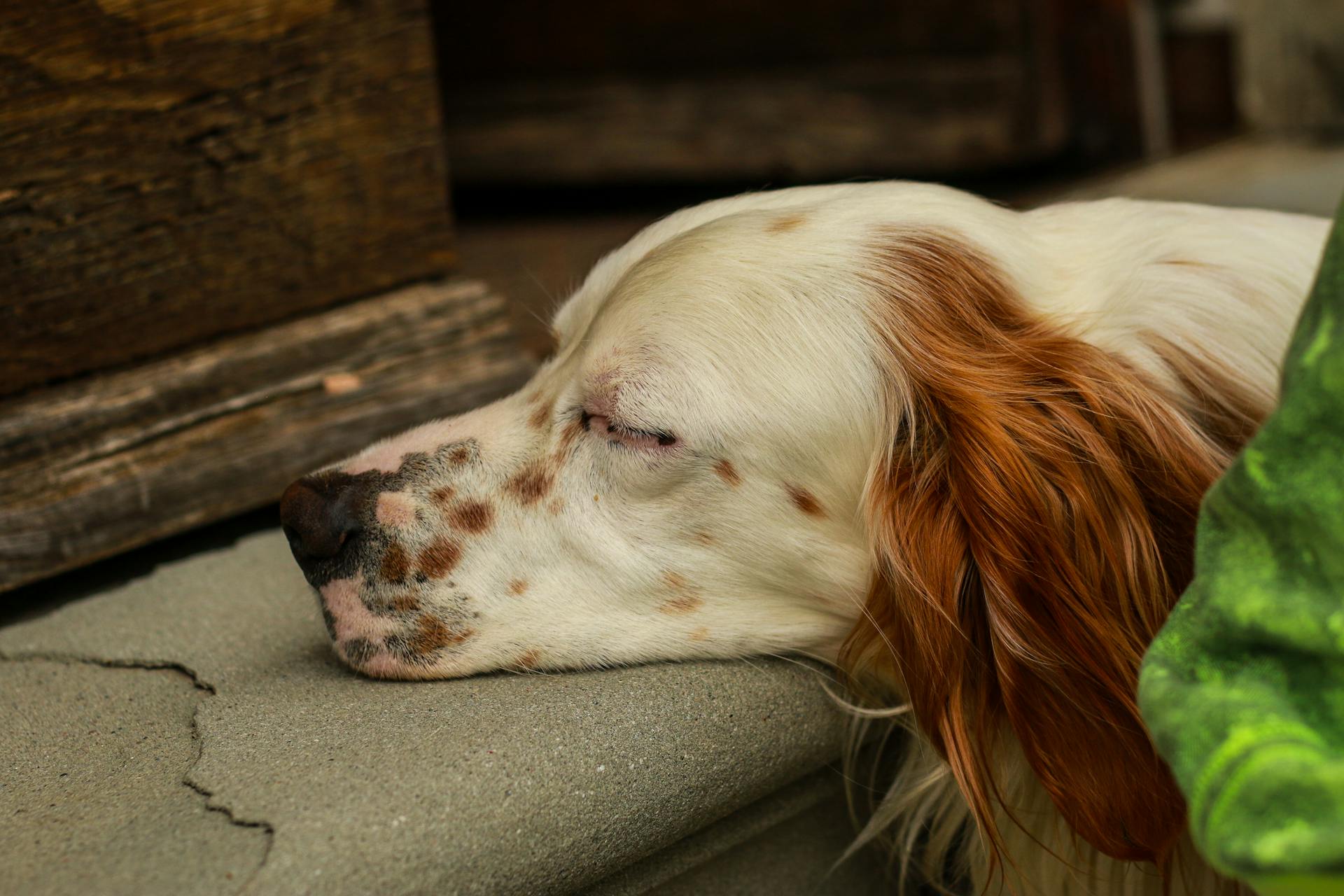
Boerboels come in a range of coat colors including red, fawn, brown, brindle, and black.
Their coats can also have white spots, especially around the neck, face, and paws, although more than 30 percent white is considered a fault.
Dark markings around the eyes, mouth, and nose are common, and some Boerboels have dark patches around their paws too.
Check this out: Dark Border Terrier
Buying a Dog
Owning a dog is a big responsibility that requires careful consideration. If you're thinking of buying a dog, you need to think about your needs and whether you have the means to care for it for its entire life.
Before making a decision, consider whether you're looking for a puppy or an adult dog, and whether you want a male or female dog. You should also think about whether you have sufficient space and a secure environment for a large breed dog.
Owning a large breed dog like a Boerboel requires a lot of time, effort, and training. You need to have the necessary knowledge of canine behavior to raise a large dog with protective instincts.
It's essential to obtain as much information as possible about the breed and breed standards by talking to breeders and members of the breed association. This will help you make an informed decision and ensure you're prepared for the responsibilities that come with owning a Boerboel.
See what others are reading: Big Mixed Breed Dogs
Suitable Accessories
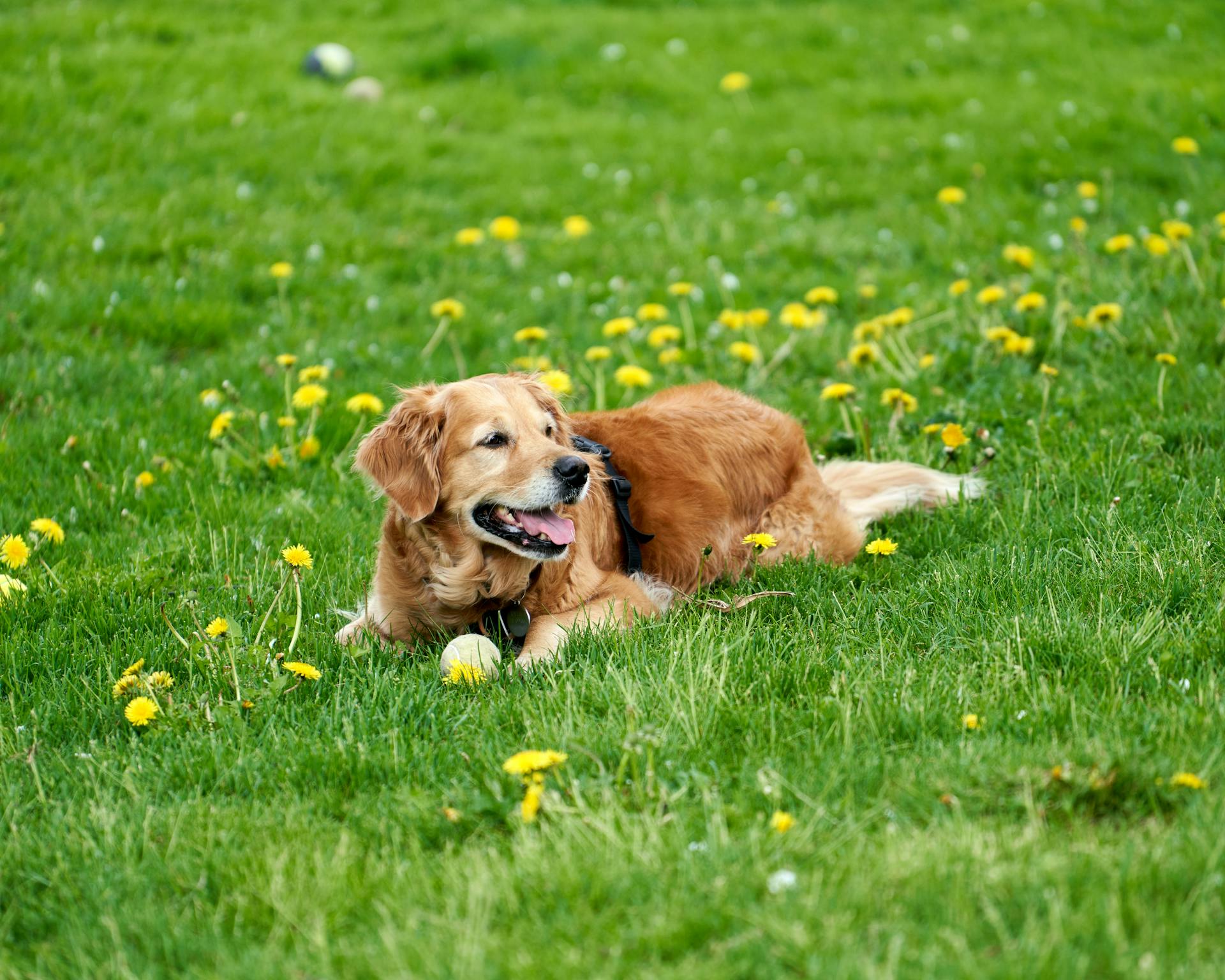
When buying a Boerboel, it's essential to get the right accessories to ensure your dog's comfort and safety.
A sturdy, well-fitting collar is a must, as Boerboels are very strong and heavy. They can weigh up to 150 pounds, so you'll want a collar that can handle that weight.
Chains and collars with spikes are not suitable for Boerboels, as they can cause pain.
A short lead is sufficient for everyday use, but you may want to consider a trailing lead for training.
Your Boerboel will need a large, sturdy food bowl and a large water bowl that's always filled and within reach. Stainless steel bowls are a great option because they're easy to clean and durable.
Your Boerboel will appreciate having a fixed place to sleep, such as a basket or a large dog mat.
A different take: Large Bully Breeds
Final Thoughts
If you're thinking of bringing a Boerboel into your family, it's essential to consider their large size and energy needs.
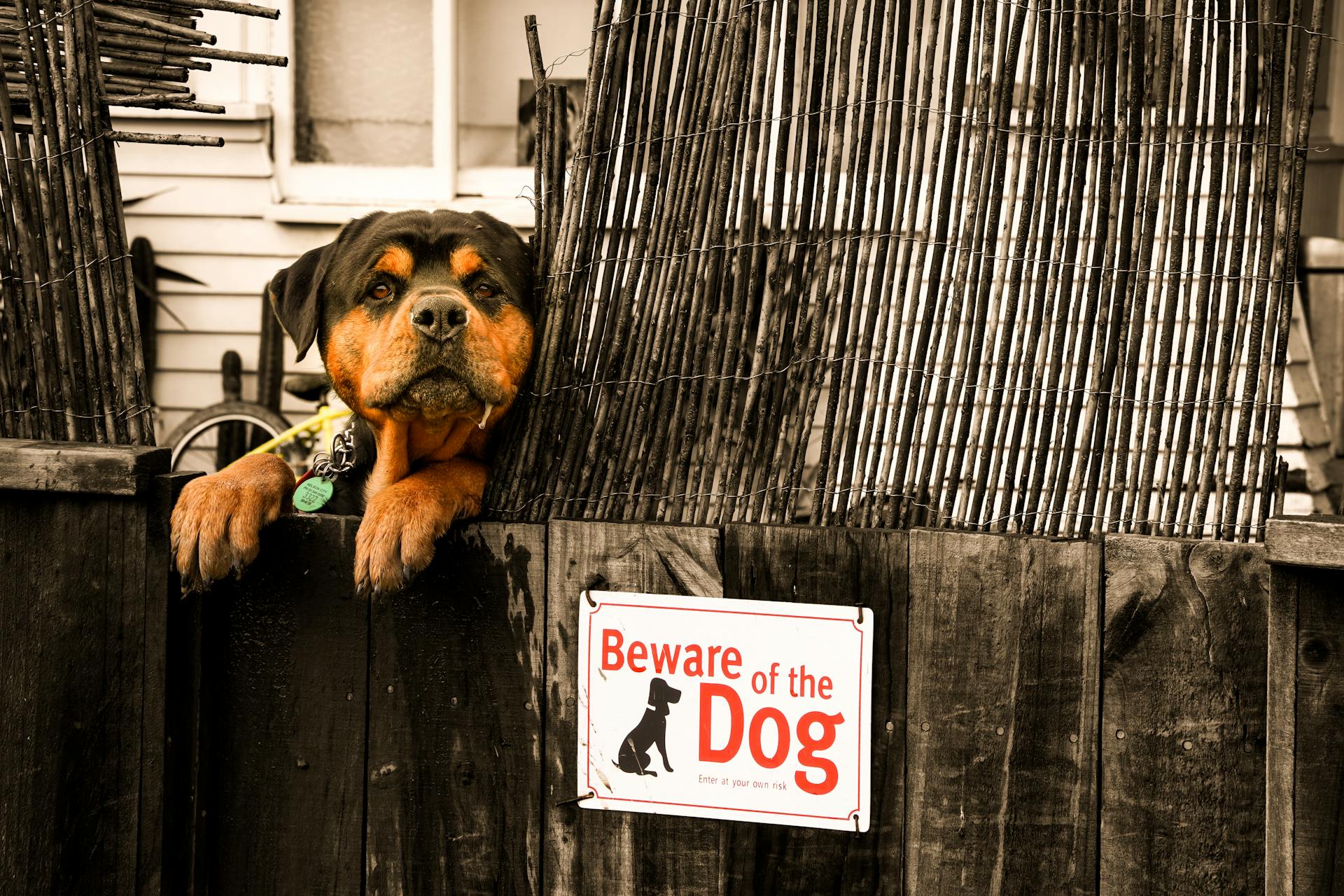
Proper training is crucial for these ginormous dogs, and it's best suited for dog parents with some experience.
Daily exercise is a must to reduce stress levels and make training easier. A bored, under-exercised dog is much harder to train and socialize than one with an outlet for pent-up energy.
To give your Boerboel the best chance at a happy and well-adjusted life, make sure to provide plenty of physical and mental stimulation.
Here are some general guidelines for daily exercise and training:
Featured Images: pexels.com
